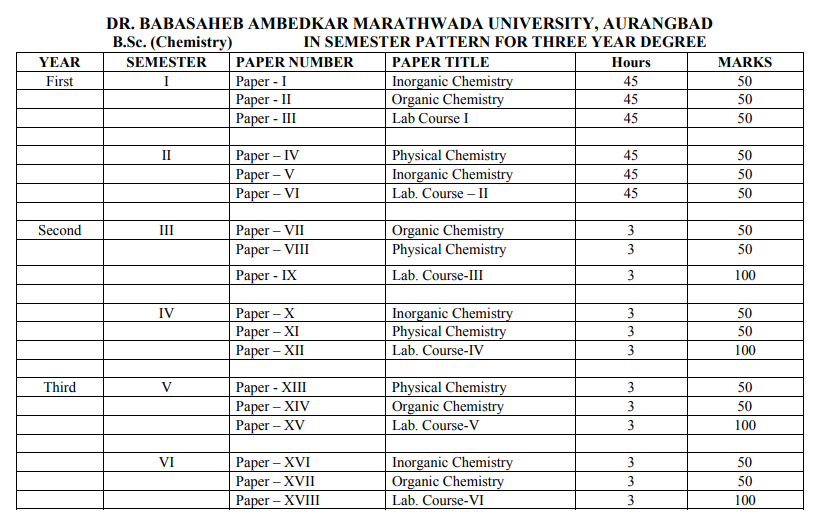Departmental Activity
Departmental Schedule
- Mon - Tues :
10.00 am - 05.00 pm
- Wednes - Thurs :
10.00 am - 05.00 pm
- Fri :
10.00 am - 05.00 pm
- 2'nd & 4'th Sat.
Open
- Sun :
Colosed

 About Department
About Department
The department of chemistry was established in 1989 with one faculty and 60 students, now more than 250 students and four faculties are working in the department. The department has well equipped laboratories for Physical and qualitative Chemistry, a storeroom and a staff room. Six faculty members are Ph. D. two are SET qualified and one is NET. Dr. Babasaheb Ambedkar Marathwada University, Aurangabad has recognized five teachers for post graduate teaching and four teachers are Ph. D. Guide. Dr. Babasaheb Ambedkar Marathwada University, Aurangabad has recognized Ph. D. research center to Chemistry since June 2014. Departmental library with more than 300 books, Journals and thesis have been very useful to UG, PG as well as research students. Department is always engaged in the active research. Nine minor and one major project are completed, funded by UGC and Dr. Babasaheb Ambedkar Marathwada University, Aurangabad. One major project is ongoing, funded by DST, New Delhi under fast track young scientist scheme. Staff members of the department regularly attended state, National and International level Seminar, Conferences and Symposia and present their work. Staff Members have published more than 300 papers in National and International reputed journals. In last five year they have published 90 papers in reputed and referred Journals. Faculties of the department are the life members of National societies, reviewers and members on editorial board of National and International reputed journals Department has organized two National conferences funded by UGC (WRO), Pune and two regional workshops in collaboration with Dr. Babasaheb Ambedkar Marathwada University, Aurangabad. Department has published proceeding of National Conference on ‘Current Trends in Chemical Research’ (NCCTCR-2012) with ISBN number. Department is collaborated with various colleges, such as Ferguson College, Pune, Shivaji College Kannad, Govt. college of Arts and Science Aurangabad, Milind College of Science Aurangabad, research organization ACTRA, Microlab Surat by signing MOU with them. Various activities such as group discussion, seminars are arranged for the students to develop the communicative skills. The department arranges science exhibition, workshop, science quiz and guest lecture of eminent from other colleges, University and industries. The students under the guidance of teachers publish a wall magazine namely Chemia. |
| Department works on developing strategy to provide, well-equipped laboratories, and industry oriented syllabus with add-on short term certificate courses which prepare the students for a best career in industry. |
 Syllabus
Syllabus
Teaching Syllabus
 Programme Outcomes
Programme Outcomes
PO-CO-PSO
| Course | Course Outcomes |
|---|---|
| Program Outcome | •To be familiarized with the emerging areas of Chemistry and their applications in various spheres of
Chemical sciences and to apprise the students of its relevance in future studies.
• Identify problems and independently propose solutions using creative approaches, acquired through interdisciplinary experiences, and a depth and breadth of knowledge/expertise in the field of chemistry • To understand basic facts and concepts in Chemistry while retaining the exciting aspects of Chemistry so as to develop interest in the study of chemistry as discipline • To develop problem solving skills. To develop skills in the proper handling of apparatus and chemicals • To be exposed to the different processes used in industries and their applications. • Students will be able to access the primary literature, identify relevant works for a particular topic, and evaluate the scientific content of these works. • Synthesize complex information appropriate to the discipline • Exhibit disciplined work habits as an individual. • Students will employ critical thinking and the scientific method to design, carry out, record and analyze the results of chemical experiments and get an awareness of the impact of chemistry on the environment, Society and other cultures outside the scientific community. • To build a scientific temper and to learn the necessary skills to succeed in research or industrial field |
| Program Specific Outcome | • To enable the students to know about the radio activity, acid and bases, the role of solvent in chemical
reactions
• The ability to explain chemical nomenclature, structure, reactivity, and function in their specific field of chemistry. • To enable the students to learn about the extraction principles and mechanism of some addition reaction. • To learn the different theories of reaction rates and factors affecting reaction rates • To impart essential theoretical knowledge on atomic structure, periodic properties, chemical bonding, and nuclear chemistry. • To learn atomic structure, basics of the concept of equilibrium • The students will learn the important analytical and instrumental tools used for practicing chemistry. • To develop skills for quantitative estimation using the different branches of volumetric Analysis • To have exposure to various emerging new areas of organic chemistry. • To give an outline of applied organic chemistry and the applications of organic chemistry in various spheres of chemical sciences. • Enable the student to get understand the laws of thermodynamics, Adsorption. To know the basic concepts in classical thermodynamics and to learn the thermodynamic aspects of various processes and reactions • To be able to define and resolve new problems in Chemistry and participate in the future development of Chemistry • To impart students a broad outline of the methodology of science in general and Chemistry in particular • To verify the some important principles in physical chemistry and to determine various physical properties • To give awareness of the Safety in laboratory. • To give awareness of the principle of inorganic qualitative analysis, and different Analytical techniques • The students will get training in the quantitative analysis of metal ions and anions using gravimetric method • To enable the students to learn about the kinetics of reaction To study the magnetic properties of molecules, chemical kinetics and photo chemistry • To gain skill to apply group theory to vibrational and electronic spectroscopy • Understanding the need of modern tools in chemical sciences • To impart the students thorough idea in in the chemistry of carbohydrates, heterocyclic compounds, amino acids, proteins and nucleic acids. • To know the basics principle of different techniques employed in molecular spectroscopy • Students learn the application of solvent extraction, chromatographies. • To understand the general characteristics of the d and f block elements • To give the students a thorough knowledge of the different theories to explain the bonding in coordination compounds. • To develop the ability to apply the principles of Chemistry. • Interpretation of collected information and use of information to evaluate Chemical Compounds • The design and execution of the experiment should demonstrate an understanding of good laboratory and the proper handling of chemical waste streams and also explain how the applications of Chemistry relates to the real world. • To impart the students a thorough knowledge of Systematic qualitative analysis of mixtures containing two acid and two basic radicals with interfering radical by Semi micro method |
| Paper No.I Inorganic Chemistry | This course will provide an insight into some of the fundamental concepts and Principles those are very essential in the study of chemistry. |
| Paper No.II Organic Chemistry | To predict the outcome and mechanism of some simple organic reactions, using a basic understanding of the relative reactivity of functional groups. • To make students capable of understanding and studying nomenclature and classification of organic compounds, organic reactions • To know stereochemistry and various possible conformations of organic compounds and how it affects the reaction outcome • To understand the role of various reaction intermediates like carbanion, carbocation, carbenes, radicals etc. in organic reactions |
| Paper No.IV Physical Chemistry |
• This course gives the student idea about the nature and purity of the crystal • To understand the general characteristics of different states of matter. • To impart knowledge to the students about the intermolecular forces in gases and liquids, the structure of solids, Defects in solids |
| Paper No.V Inorganic Chemistry Electronics | • To enable the students to get a clear idea about the molecular structure • To have a basic idea about nuclear Chemistry and its applications |
| Paper No. III & VI Lab Course |
• Students will gain an understanding of methods of analysis related to chemical analysis goals such as detection of elements. • To develop skills required for the qualitative analysis of organic compounds, determination of physical constants. • To impart the students a thorough knowledge of Systematic qualitative analysis of mixtures containing two acid and two basic radicals |
| Paper No.VII Organic Chemistry |
• To enable the students to understand and study Organic reaction mechanisms. • The students will understand some fundamental aspects of organic chemistry. • They will learn mechanism of some organic reactions, • To acquaint knowledge on Aromaticity and coordination chemistry |
| Paper No.VIII Physical Chemistry B.Sc. SY (SEM -IV) |
• To provide an insight into the characteristics of different types of solutions and electrochemical phenomena. • To learn ionic equilibrium and electrical properties of ions in solution |
| Paper-X Inorganic Chemistry |
• To understand the magnetic properties of complexes and to know how magnetic moments can be employed for the interpretation of their structure • To learn the concepts of acids and bases, pH and buffer solutions. |
| Paper No.XI Physical Chemistry |
• To study phase diagrams and elementary idea of catalysis. • Students to learn about electro chemistry. To study EMF, pH and their applications. • Electrochemistry discussed electrical properties of ionic solutions. Different applications are there of this course. |
| Paper No.IX & XII Lab Course |
• To enable the students to know about principles and applications of Analytical techniques, • Evaluation of Analytical data, Statistical texts and data, Theory of Quantitative Analysis, Gravimetric methods • Enable the students to estimate the binary mixtures of metallic ions by volumetric and gravimetric methods |
| Paper No.XIII Physical Chemistry |
• This course also discusses details of synthesis, structure of some specific nano molecules. • To enable the students to solve the simple quantum mechanical models such as simple harmonic oscillator, particle in a 1D- box, rigid rotor, H atom etc. • To impart a thorough knowledge of the fundamentals of microwave, infra red, Raman, electronic and magnetic resonance spectroscopy. |
| Paper No.XIV Organic Chemistry |
• Studies on various important plant families with similar characters. Various classification systems.This course gives a detail knowledge to the student about the analysis of statistical data they got through from different chemical experiment. • To identify organic compound using UV, IR and PMR spectroscopic techniques and elucidate the structure of compounds by analyzing the spectral data • This course will give insight into the processes involved in the production of soaps, detergents, cosmetics |
| Paper No.XVI Inorganic Chemistry |
• This course discussed about the synthesis and properties of these organometallics, important in
biological bodies like haemoglobin, chlorophylls, Vitamin B12, metal carbonyls and metal clusters • This course gives student knowledge about the synthesis of different complexes and their analytical study by spectroscopy • To understand the functions and applications of bioorganic compounds, valence bond and molecular orbital theory |
| Paper No.XVII Organic Chemistry |
To enable the students to learn about carbohydrates, amino acids and hetero cyclic compounds.
44 • To understand the importance of carbohydrate, amino acids in chemistry |
| Paper No.XV & XVIII Lab Course |
• Students will gain an understanding of methods of analysis related to chemical analysis such as
detection of function groups. • The students will develop basic skills in the techniques of crystallization, distillation, TLC . • To learn the separation and purification of an organic mixture by chemical/solvent separation methods, Enable the students to prepare organic compounds |
| M.Sc CHEMISTRY | |
| Program Outcome : |
• Identify problems and independently propose solutions using creative approaches, acquired
through interdisciplinary experiences, and a depth and breadth of knowledge/expertise in the field
of chemistry • To understand basic facts and concepts in Chemistry while retaining the exciting aspects of Chemistry so as to develop interest in the study of chemistry as discipline • To develop problem solving skills. To develop skills in the proper handling of apparatus and chemicals • To be exposed to the different processes used in industries and their applications. • Synthesize complex information appropriate to the discipline • Exhibit disciplined work habits as an individual. • Students will employ critical thinking and the scientific method to design, carry out, record and analyze the results of chemical experiments and get an awareness of the impact of chemistry on the environment, Society and other cultures outside the scientific community. • To build a scientific temper and to learn the necessary skills to succeed in research or industrial field. |
| Program Specific Outcome : |
• To enable the students to learn about the extraction principles and mechanism of
some addition reaction. • The ability to explain chemical nomenclature, structure, reactivity, and function in their specific field of chemistry. • To enable the students to know about the radio activity, acid and bases, the role of solvent in chemical reactions. • To learn the different theories of reaction rates and factors affecting reaction rates • To give an outline of applied organic chemistry and the applications of organic chemistry in various spheres of chemical sciences. • To be able to define and resolve new problems in Chemistry and participate in the future development of Chemistry • To impart students a broad outline of the methodology of science in general and Chemistry in particular |
| Paper No. CHE-101 Analytical Chemistry |
• This course will provide an insight into some of the fundamental concepts and
Principles those are very essential in the study of spectroscopic methods and
analysis of compounds using these techniques. 74 • To learn the concepts of different separation techniques, different types of chromatographic techniques and Gas, HPLC, • To be able to define and resolve new problems on statistical treatment of analytical data |
| Paper No. CHE-102 Inorganic Chemistry |
• This course gives the student idea about role of essential elements in
biological system such as Fe, Cu, Zn, Mn etc. • To understand the general characteristics, synthesis of transition metal complexes • To impart students to learn group theory and symmetry of the elements. • To understand the magnetic properties of complexes and to know how magnetic moments can be employed for the interpretation of their structure |
| Paper No. CHE-103 Organic Chemistry |
• To predict the outcome and mechanism of some simple organic reactions, using a
basic understanding of the relative reactivity of functional groups. • To enable the students to get knowledge about nature of chemical bonding with examples. • To learn reaction mechanism of aliphatic nucleophilic and electrophilic substitution reactions and their intermediates. • To know stereochemistry and various possible conformations of organic compounds and how it affects the reaction outcome |
| Paper No. CHE-104 Physical Chemistry |
• To enable the students to get a clear idea about chemical dynamics and classical
thermodynamics. • Enable the student to get understand the laws of thermodynamics, Adsorption, chemical equilibrium, Ionic equilibrium and biological reactions • To know the basic concepts in classical thermodynamics and to learn the thermodynamic aspects of various processes and reactions. • To enable the students to know concepts and theories in electrochemistry and surface chemistry. |
| Paper No. CHE-205 Spectroscopic Methods of Analysis |
• The students will understand some fundamental aspects of spectral methods of
analysis. • To give the students a thorough knowledge of the different types of spectroscopic techniques such as UV, IR, NMR, Mass, C-13 and combined problems on the basis these data. • The students will understand some fundamentals of microwave, vibrational and Raman spectroscopy. • To learn about photoelectron spectroscopy and thermal methods of analysis. |
| Paper No. CHE-206 Inorganic Chemistry |
• To provide an insight into the characteristics of different types of solutions
and electrochemical phenomena. • To learn electronic spectra and magnetic properties of metal complexes. 75 • To give the students a thorough knowledge of the different theories to explain the bonding in coordination compounds, metal carbonyls and metal notrosyls. • To impart essential theoretical knowledge on spectroscopic term symbols. • Students to learn about Dioxygen and Dinitrogen complexes |
| Paper No. CHE-207 Organic Chemistry |
• To make students capable of understanding and studying Aromatic electrophilic
and Nucleophilic substitution • To understand the role of various reaction intermediates like carbanion, carbocation, carbenes, radicals in reactions. • To impart knowledge addition to Carbon- carbon bond and carbon – heterobonds. • To make students capable of understanding and studying different elimination reactions and rearrangements with mechanism |
| Paper No. CHE-208 Physical Chemistry |
• To study phase diagrams and elementary idea of crystallography and structure of
crystal. • Students to learn about photochemistry and terms involved in photochemical reactions. • To impart knowledge to the students about the quantum chemistry. • To verify the some important principles in physical chemistry and to determine various physical properties |
| Lab Course Paper-209, 210, 211, 212 |
• To enable the students to know about principles and applications of Analytical
techniques, Evaluation of Analytical data, Statistical texts and data, Theory of
Quantitative Analysis, Gravimetric methods • Enable the students to estimate the binary mixtures of metallic ions by volumetric and gravimetric methods • Students will gain an understanding of methods of analysis related to chemical analysis goals such as detection of elements. • To develop skills required for the qualitative analysis of organic compounds, determination of physical constants. • To impart the students a thorough knowledge of Systematic qualitative analysis of mixtures containing two acid and two basic radicals |
| Paper No. 313 Str. Elucidation by Spectral Methods |
• To give the students a thorough knowledge of the different types of
spectroscopic techniques such as UV, IR, NMR, Mass, C-13 and combined problems
on the basis these data. • To impart a thorough knowledge of the fundamentals of microwave, infra red, Raman, electronic and magnetic resonance spectroscopy. • To learn the instrumentation and application of Mossbauer, ESR spectroscopic techniques |
| Paper No. CHE-314 Organic Synthesis |
• To impart a thorough knowledge of the different Reagents and organomettalic
compounds used in organic synthesis and their application in organic synthesis. • This course will give insight into the processes involved in oxidation , reduction of reactions. • This course gives student knowledge about the predict the products of different chemical reactions. |
| Paper No. CHE-315 Asymmetric Synthesis & Bio-organic Chemistry |
• This course gives student knowledge about the synthesis of different enzymes and
co enzymes and their analytical study. • To understand the functions and applications of bioorganic compounds, supramolecular and biomimic chemistry to students. • To have exposure to various emerging new areas of assymetric synthesis in organic chemistry |
| Paper No. CHE-316 Photo, free radical & Pericyclic Reaction |
•To enable the students to learn about types of pericyclic reactions and its
applications. • To understand the importance of free radicals, carbanion and carbonations in chemistry. • This course gives student knowledge about concept of photochemistry and different photochemical reactions and applications |
| Paper No. CHEO-417 Org. Synthesis Retrosynthetic approach |
• Understanding the need of modern tools in chemical sciences such as C-C
disconnections and reactions. • Interpretation of collected information and use of information Ring synthesis with applications. • This course gives detail knowledge to the student about organic synthesis and retire synthesis approach. |
| Paper No. CHEO-418 Advance Organic & Heterocyclic Chemistry |
• To enable the students to understand and study Organic reaction mechanisms. • 2. To acquaint knowledge on organic named reactions and their application in synthesis. • 3. To enable the students to understand and study different types rearrangements with mechanism, • To acquaint knowledge on four, five and six member heterocyclic compounds, its synthesis and reactions. |
| Paper No. CHEO-419 Chemistry of Natural Products |
• This course discussed about the synthesis and properties of these Natural
Products and their importance. • This course also discusses details of synthesis, structure of some specific molecules such as terpenoids, alkaloids, steroids, flavones, anthocynanin and biogenesis |
| Paper No.CHEO-420 Medicinal Chemistry |
• To enable the students to understand and study different types of medicinal
drugs, its activity and their importance for human being. • This course discussed about the synthesis and properties of medicinal drugs and their importance. • To understand the effects and side effect of different types of drugs. • To enable the students to know about pharmacokinetics and pharmacodyanics. |
| Lab Course Paper-209, 210, 211, 212 |
• Students will gain an understanding of methods of analysis related to chemical
analysis such as detection of function groups, physical constants, monitoring
reaction and preparation derivatives. • The students will develop basic skills in the techniques of crystallization, distillation, TLC • To learn the separation and purification of an organic mixture by chemical/solvent separation methods. • Enable the students for synthesis of organic compounds, its characterization and determination of physical constants through project which creates research skills |
| Lab Course Paper-209, 210, 211, 212 |
• Students will gain an understanding of methods of analysis related to chemical
analysis such as detection of function groups, physical constants, monitoring
reaction and preparation derivatives. • The students will develop basic skills in the techniques of crystallization, distillation, TLC • To learn the separation and purification of an organic mixture by chemical/solvent separation methods. • Enable the students for synthesis of organic compounds, its characterization and determination of physical constants through project which creates research skills |
 Teaching Staff
Teaching Staff
|
| |||||
|---|---|---|---|---|---|
| Sr.No. | Faculty Name | Qualification | Designation | Specialization | View Profile |
| 1. | Prof. Dr. M. B. Ubale | M.Sc., Ph.D, CCP (BAS) | Professor ( Retired on 30-06-2020) | Inorganic Chemistry | Click Here |
| 2. | Prof. Dr. J.V. Bharad | M. Sc, SET. Ph. D | Professor & Head | Organic Chemistry | Click Here |
| 3. | Dr. J.J. Chamargore | M. Sc, Ph. D | Assistant Professor | Organic Chemistry | Click Here |
| 4. | Prof. Dr. B.R. Madje | M.Sc., Ph.D., NET. | Professor | Organic Chemistry | Click Here |
 Activity
Activity
Departmental Activity
![]() Departmental Activities (2019-2020)
Departmental Activities (2019-2020)
Novel synthesis of Quinolone analogs and their cytotoxicity study. Funding Agency: DST New Delhi Sanctioned amount: 23,08000/- |
Dr. Babasaheb Ambedkar Marathwada University, Aurangabad sanctioned a Minor Research Project for two years (2019-2021) on Analytical method development for Antihypertensive formulation drug And validating the method performance for evaluation of effectiveness (Amount Rs. 50,000/-) |
A Invited Talk of Director of CIPET Aurangabad Mr. Lalit Guglani and Mr. Dhakane was organized on 10th January 2020. Students of UG and PG get knowledge of manufacturing, testing, tooling, designing, molding process of plastic materials. Students experienced actual working of industrial process by visiting different departments of CIPET. Dr. Shivaji Madje from North Carolena Rally City United States (America) visited to chemistry department and interact with students of UG and PG about scope of Chemistry and Information Technology in US. Faculty members of chemistry department involved in faculty exchange program for Vivekanand College Aurangabad and S. B. Science College Aurangabad. Guest lectures on different Topics of chemistry were organized during this activity. UG and PG students were benefited by this programme |
Prof. Dr. J.V. Bharad
H.O.D.
Department of Chemistry
View Activities here..
![]() Departmental Activities (2018-2019)
Departmental Activities (2018-2019)
1. Prof. Milind Ubale has been awarded with the prestigious ‘Adarsh Vidya Saraswati Rashtriya Puraskar’ by Global Management Council Ahmadabad. 2. Name of Dr. Jagdish Bharad is included and Biography published in Asia Pacific Who’s Who Vol. XV, Outlined Biography on Page no 67. Published by Rifacimento International, New Delhi. | ||
|
View Activities here..
![]() Department of Chemistry
Activities for the Year 2017-2018
Department of Chemistry
Activities for the Year 2017-2018
Dr. J.V.Bharad
H.O.D.
Department of Chemistry
 Alumini
Alumini
About our alumini
Sr. No.
Name of Alumni
Address of office/institution/industry
01
Mr. Sudhir V. Bharad
Assistant Manager, Glenmark, Badoda
02
Mr. Gajanan Wagh
R & D Chemist, CIPLA Pharma, Mumbai
03
Mr. Rameshwar Darade
R & D Chemist, CIPLA Pharma, Mumbai
04
Mrs. Ujwala Pawar
Chemist, Div-Daman
05
Dr. Umesh Jadhav
Aurangabad
06
Mr. Bharat Sonwane
Assistant Teacher, Vivekanad College, Aurangabad
07
Mr. Ganesh Shingare
Executive R & D, RaksPharma, Dhahej, Gujrat
08
Mr. Arun Kulkarni
Assistant Teacher, S. B. College, Aurangabad
09
Mr. Uday Patil
Executive Quality control, Lupin Ltd, Goa
10
Mr. Vitthal Patil
Executive Quality control, Cipla Ltd, Goa
11
Mr. Premanand Rinde
Assist. Manager & Production, Emcure Pharma Ltd, Daund, Pune
12
Dr. Ajit Yelwande
Assistant Professor, Indraraj College, Sillod
13
Dr. Keshav Shinde
Dept of Biochemistry Dr. BAMU. Aurangabad
14
Dr. Lalit Khillare
Research Scientist, Wockhardt Ltd, Aurangabad
15
Mr. Sharad Patil
Scientific Assistant, Regional Forensic Sci. Lab, Pune
16
Mr. Santosh Kawade
Executive Quality Assurance, Sun Pharma Ltd,A’Nagar
17
Mr. Ganesh Pawar
Executive Quality control, Mylan Laboratories Ltd, Aurangabad
18
Mr. Hemant More
Executive Quality control, Lupin Ltd, Goa
19
Mr. Dilip Khule
Executive Quality control, Mylan Laboratories Ltd. Sinner, Nasik
20
Mr. Rajendra Ghongane
Executive Quality control, Mylan Laboratories Ltd, Aurangabad
21
Mr. Pradip Borkar
Assist. Teacher, Shri ShivajiJr College Koyali (BK), Risod-Washim
22
Ms. Kiran Gawai
Assistant Teacher, Deogiri College, Aurangabad
23
Shri. Rahul Sutavane
Excecutive,Wockhardt Pharma, Aurangabad
24
Mr. Abhijit Lahane
Executive Quality control, Mumbai
25
Mr. Sanjay Magar
Aurangabad.
Sr. No.
Name of Alumni
Address of office/institution/industry
01
Mr. Sudhir V. Bharad
Assistant Manager, Glenmark, Badoda
02
Mr. Gajanan Wagh
R & D Chemist, CIPLA Pharma, Mumbai
03
Mr. Rameshwar Darade
R & D Chemist, CIPLA Pharma, Mumbai
04
Mrs. Ujwala Pawar
Chemist, Div-Daman
05
Dr. Umesh Jadhav
Aurangabad
06
Mr. Bharat Sonwane
Assistant Teacher, Vivekanad College, Aurangabad
07
Mr. Ganesh Shingare
Executive R & D, RaksPharma, Dhahej, Gujrat
08
Mr. Arun Kulkarni
Assistant Teacher, S. B. College, Aurangabad
09
Mr. Uday Patil
Executive Quality control, Lupin Ltd, Goa
10
Mr. Vitthal Patil
Executive Quality control, Cipla Ltd, Goa
11
Mr. Premanand Rinde
Assist. Manager & Production, Emcure Pharma Ltd, Daund, Pune
12
Dr. Ajit Yelwande
Assistant Professor, Indraraj College, Sillod
13
Dr. Keshav Shinde
Dept of Biochemistry Dr. BAMU. Aurangabad
14
Dr. Lalit Khillare
Research Scientist, Wockhardt Ltd, Aurangabad
15
Mr. Sharad Patil
Scientific Assistant, Regional Forensic Sci. Lab, Pune
16
Mr. Santosh Kawade
Executive Quality Assurance, Sun Pharma Ltd,A’Nagar
17
Mr. Ganesh Pawar
Executive Quality control, Mylan Laboratories Ltd, Aurangabad
18
Mr. Hemant More
Executive Quality control, Lupin Ltd, Goa
19
Mr. Dilip Khule
Executive Quality control, Mylan Laboratories Ltd. Sinner, Nasik
20
Mr. Rajendra Ghongane
Executive Quality control, Mylan Laboratories Ltd, Aurangabad
21
Mr. Pradip Borkar
Assist. Teacher, Shri ShivajiJr College Koyali (BK), Risod-Washim
22
Ms. Kiran Gawai
Assistant Teacher, Deogiri College, Aurangabad
23
Shri. Rahul Sutavane
Excecutive,Wockhardt Pharma, Aurangabad
24
Mr. Abhijit Lahane
Executive Quality control, Mumbai
25
Mr. Sanjay Magar
Aurangabad.
 Certificate Course
Certificate Course
About Certification Courses
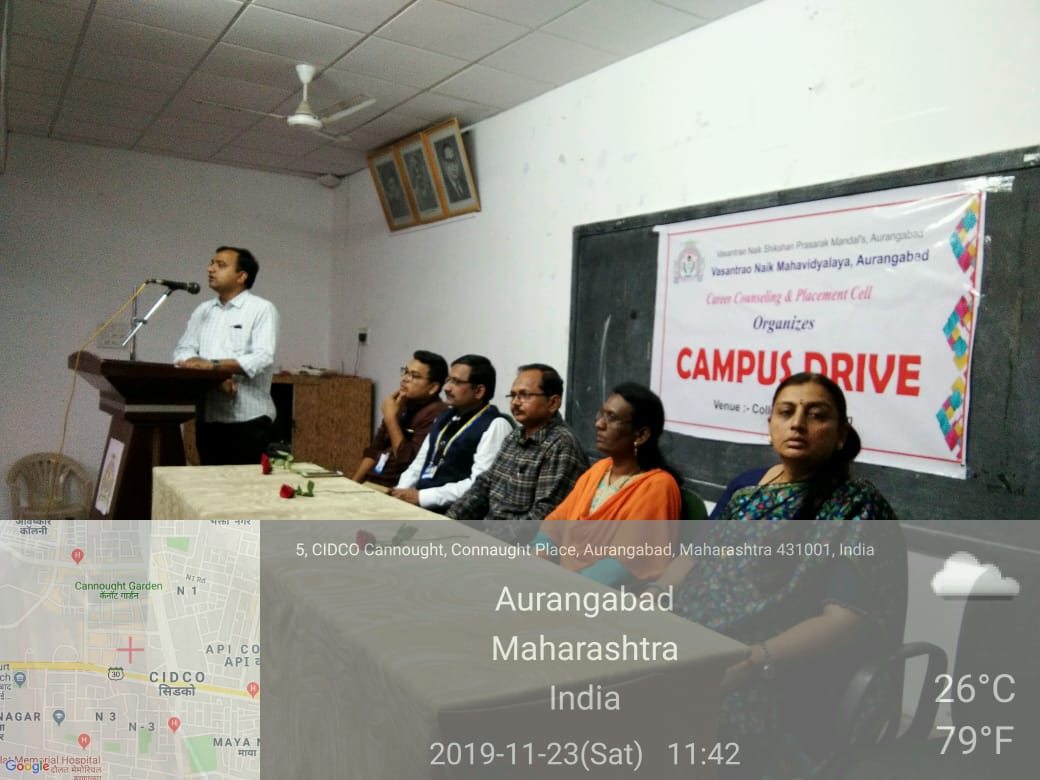
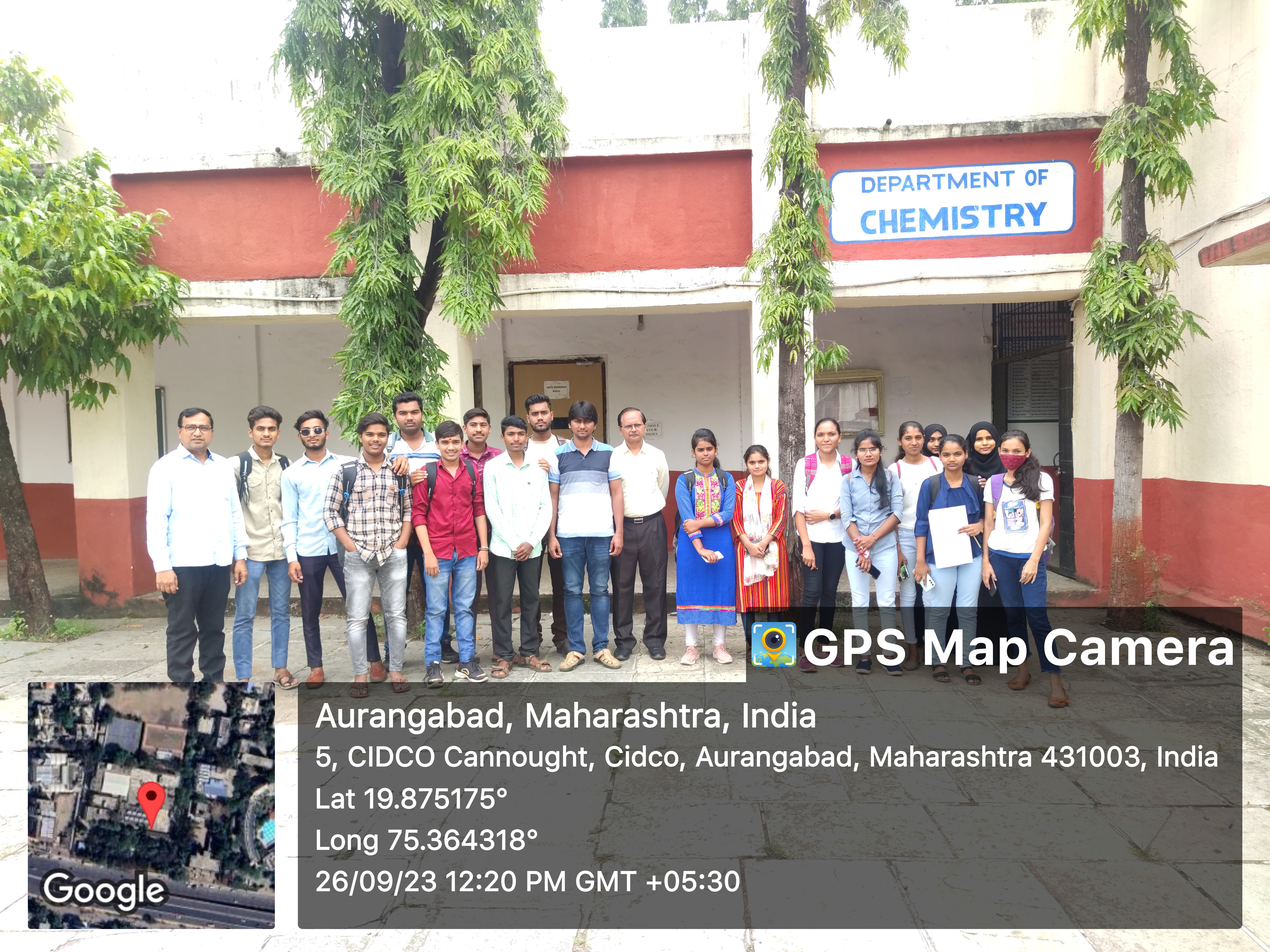
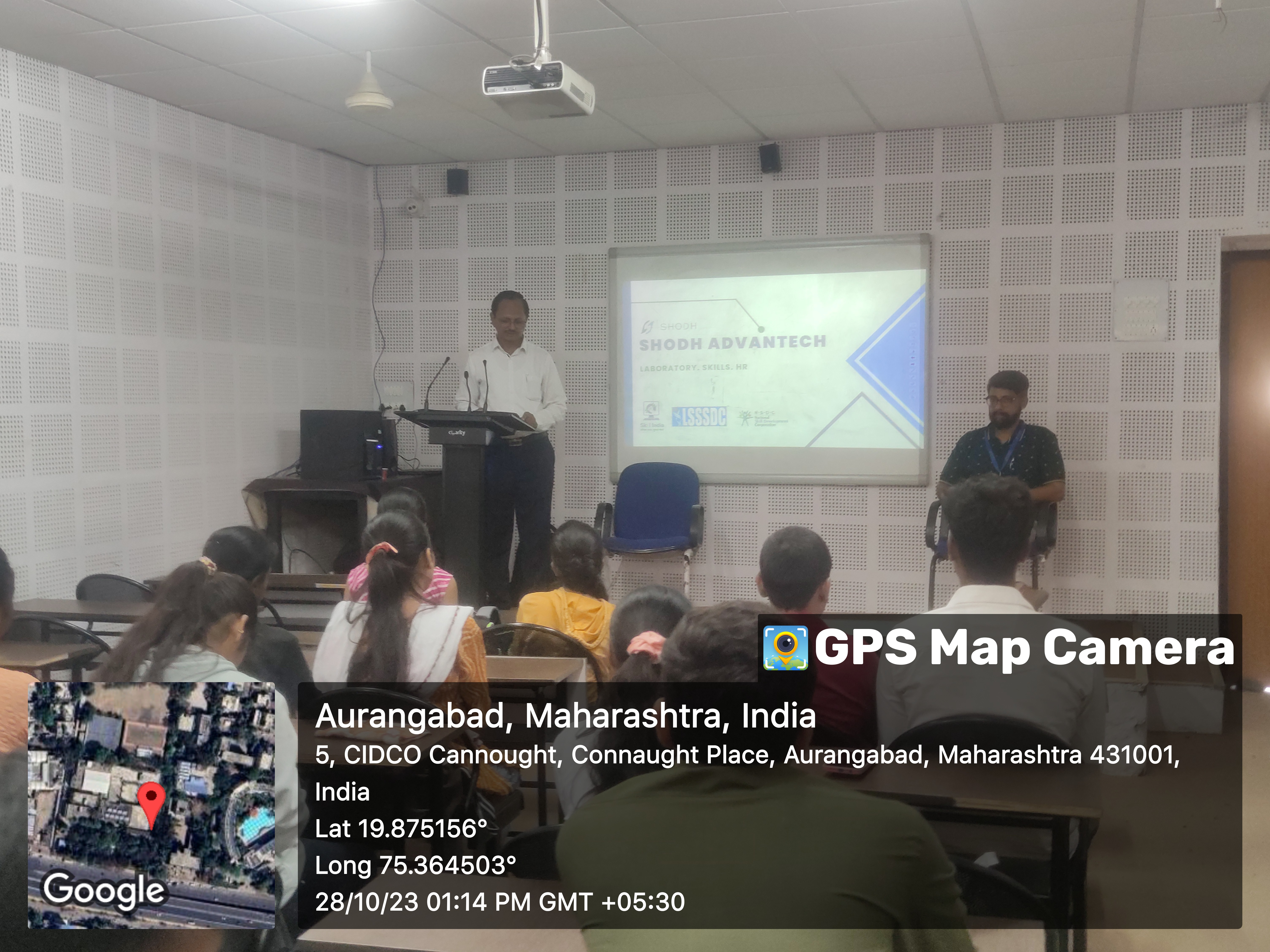
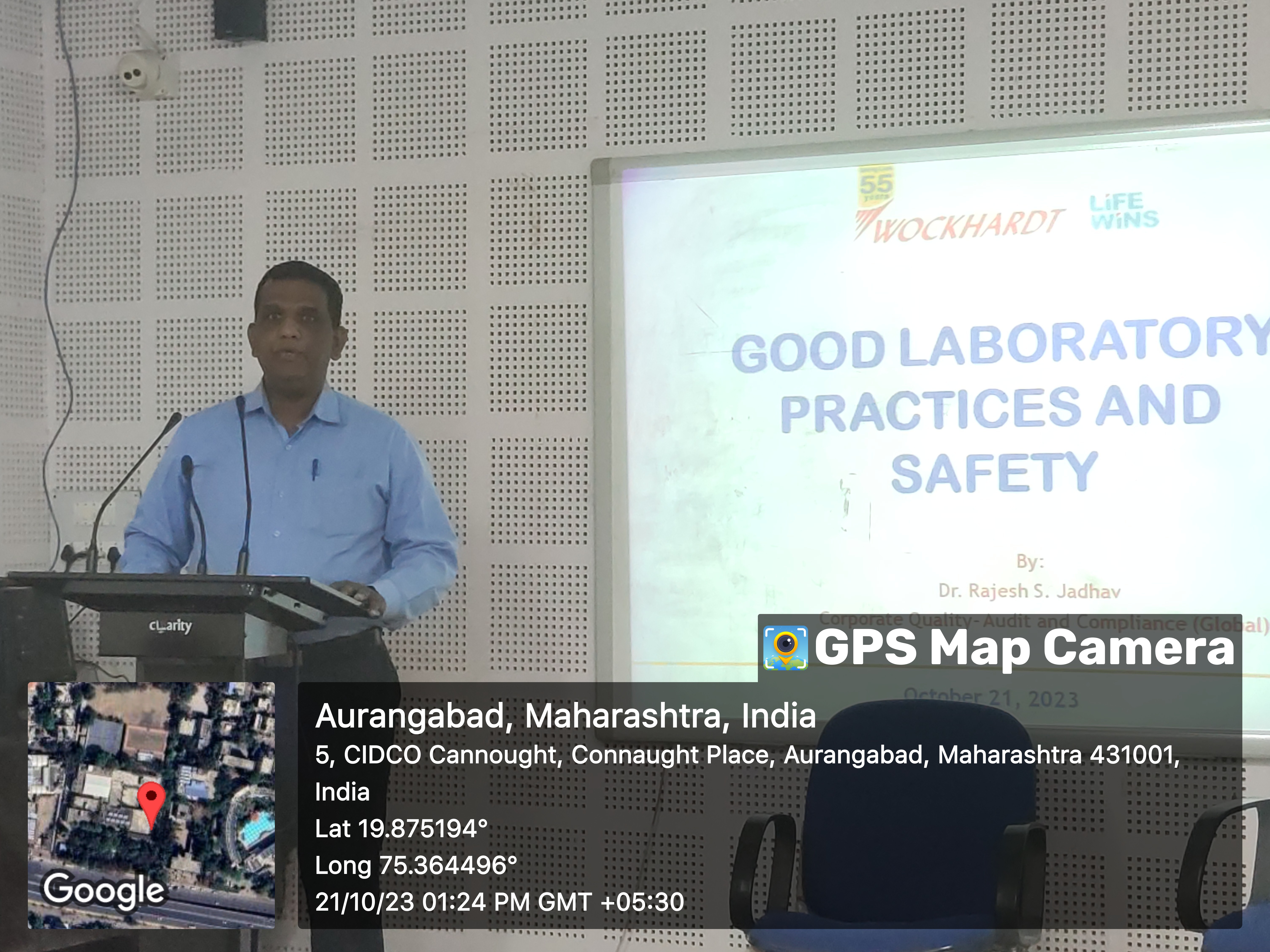
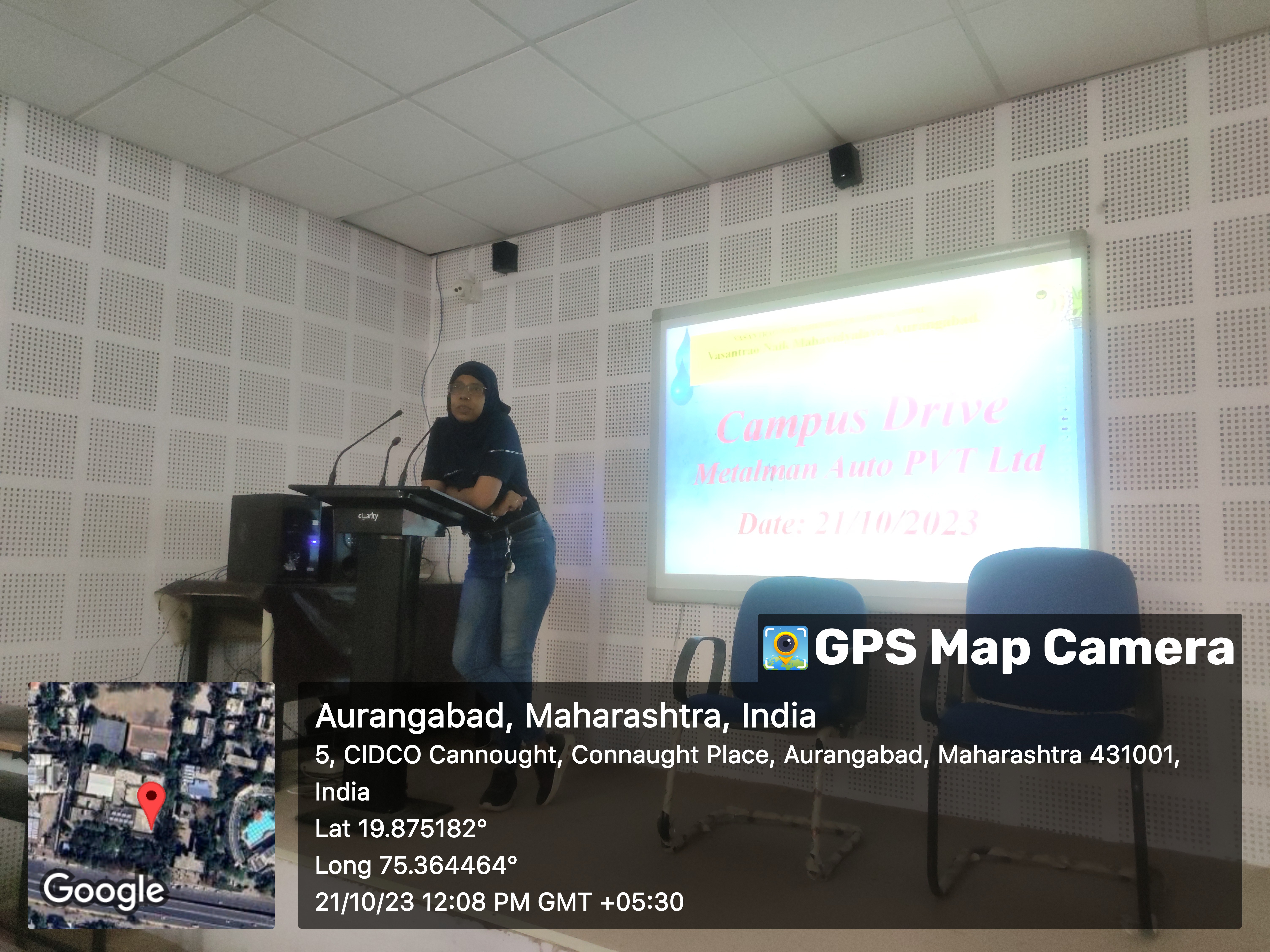
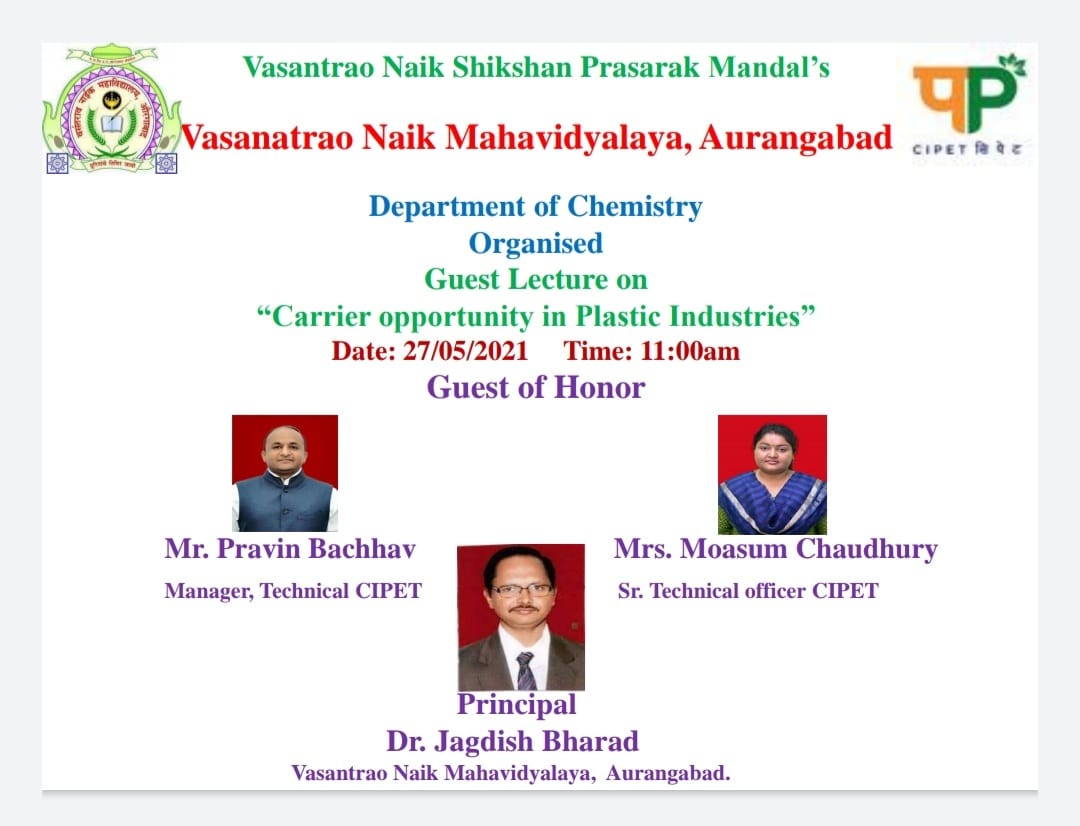
.jpg)


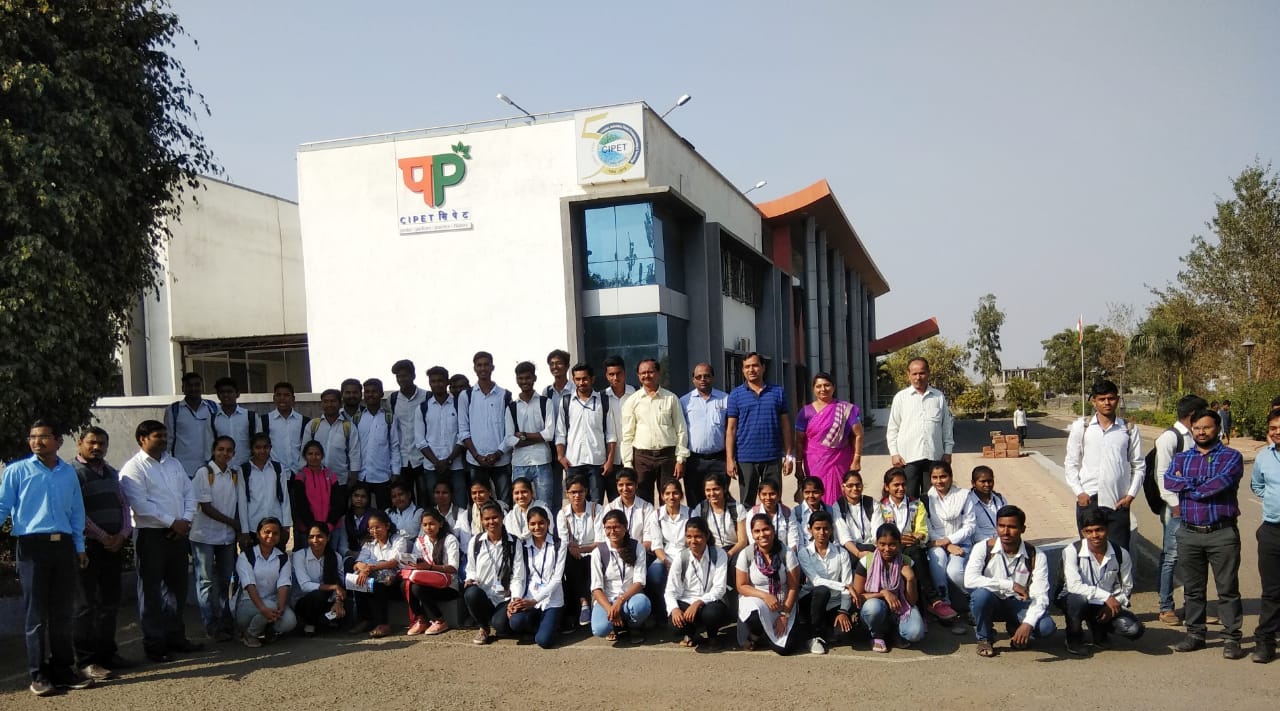




 B.Sc.Chemistry
B.Sc.Chemistry